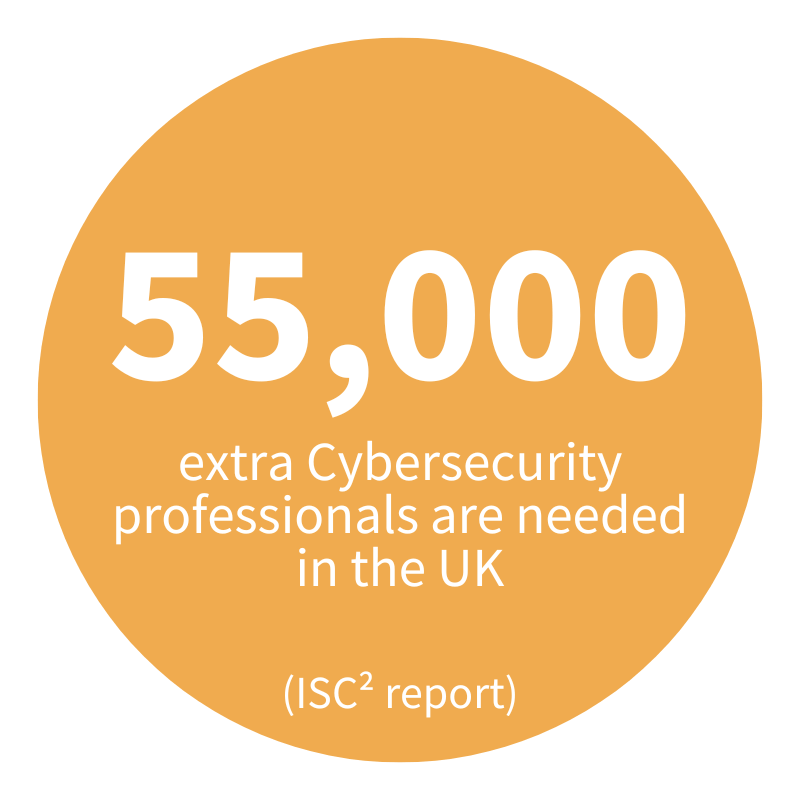
How do I get into Cybersecurity?
The cybersecurity industry is rapidly expanding, and the demand for skilled professionals is higher than ever before.
The UK has seen a tremendous rise in cyber threats, and has therefore driven organisations to invest heavily in security.
If you’re looking to break into this dynamic, critical and vastly in-demand industry, here’s what you need to know.
The growing demand for jobs in Cybersecurity
The digital age has brought with it both unparalleled opportunities and significant risks. With more businesses moving operations online, cyberattacks have become a lot more frequent and sophisticated.
According to the UK Government’s Cyber Security Breaches Survey 2023, 32% of businesses reported a cyber breach or attack in the last 12 months.
And cybercrime isn’t just limited to large companies. Small and medium-sized businesses (SMEs) are just as vulnerable.
In fact, 51% of small businesses experienced a cyber attack in 2023, a stark reminder that cybersecurity is a top priority across all sectors.
The UK is home to a thriving tech industry as we know, but the shortage of skilled cybersecurity professionals remains a pressing issue.
This gap presents a significant opportunity for those looking to enter the profession. Whether you’re transitioning from another industry, or starting fresh, there are various pathways into cybersecurity.

Key entry-level jobs in Cybersecurity
Job vacancies across cybersecurity continue to rise. Data from LinkedIn and job sites like Indeed and Glassdoor indicate that there were over 30,000 unfilled cybersecurity roles in 2023, with a notable demand for entry-level positions.
Here are some of the most common entry-level roles that can serve as a stepping stone for a career in cybersecurity.
1. Security Analyst
(£30,000 average salary)
A Security Analyst is responsible for monitoring an organisation’s network for any suspicious activity, detecting vulnerabilities, and responding to security incidents. They work with various security tools, conduct threat analysis, and ensure that firewalls, antivirus, and other defence mechanisms are operational.
Key skills:
Monitoring systems, basic threat detection, analytical thinking, and knowledge of common security tools (e.g. SIEM tools).
2. Incident Response Analyst
(£33,000 average salary)
An Incident Response Analyst is responsible for identifying, investigating, and responding to security breaches.
They work with the IT team to contain and mitigate the effects of an attack and later conduct forensic analysis to determine the root cause.
Key skills:
Understanding of malware, forensics, network security, and response strategies.
3. Penetration Tester
(£35,000 average salary)
Also known as an ethical hacker, a Penetration Tester is tasked with attempting to breach an organisation’s systems to find vulnerabilities before malicious hackers do. Entry-level penetration testers work under the supervision of senior professionals and focus on testing small sections of systems or networks.
Key skills:
Knowledge of ethical hacking, network and web application security, and scripting languages like Python. If you need to brush up on your Python skills, we offer a fully funded AI Programming with Python course with an accredited Level 3 certificate on completion.
4. IT Security Support
(£25,000 average salary)
Many cybersecurity professionals begin their careers in IT support roles, where they build a solid foundation in networking, system administration, and basic security practices. Entry-level IT roles, such as Help Desk Technician or IT Support Specialist, often involve handling security incidents, providing a good starting point.
Key skills:
Basic networking, system administration, troubleshooting, customer support.
How to get your first job in Cybersecurity
1. Understand the skills you'll need for a role in Cybersecurity
To succeed in an entry-level cybersecurity position, you’ll need a range of both technical and soft skills.
Technical skills:
- Basic understanding of networking protocols (TCP/IP, DNS, HTTP)
- Familiarity with Linux and Windows operating systems.
- Awareness of common cyber threats and attack vectors, such as phishing and malware.
- Knowledge of firewalls, intrusion detection systems (IDS), and security information and event management (SIEM) tools.
Soft skills:
- Analytical thinking and problem-solving.
- Strong communication skills, especially when explaining technical issues to non-technical stakeholders.
- Attention to detail, essential for identifying and responding to security threats.
- Ability to work under pressure, particularly in incident response situations.

2. Get some relevant certifications and upskill
Before entering industry, it’s a good idea to get certified via an entry-level course to learn the fundamentals of cybersecurity.
Our fully-funded Cybersecurity for Beginners course provides a thorough introduction to all things cyber, with units designed to give you the basic principles of working in cybersecurity, and a Level 2 accredited qualification to boost your CV.
You’ll also be introduced to other aspects of working in this industry, such as website development and basic digital and IT skills.
3. Gain some practical experience
Hands-on experience is invaluable for entry-level cybersecurity jobs. Employers often look for candidates who can demonstrate practical knowledge beyond theoretical understanding. Here’s how you can build up some experience:
- Internships and Apprenticeships: Many companies in the UK offer cybersecurity internships or apprenticeship schemes for newcomers to the industry.
- Capture the Flag (CTF) Competitions: CTF competitions allow you to practice hacking, network security, and cryptography in simulated environments.
- Volunteer Work: Non-profits and smaller organisations often need cybersecurity help, and volunteering your skills can give you both experience and a portfolio of work to add to your CV.
4. Search smart for job vacancies
When applying for entry-level cybersecurity roles, tailor your CV to emphasise any relevant certifications, skills, and practical experience you’ve gained. Highlight any personal projects, such as setting up a home lab or participating in CTF competitions, that showcase your technical skills.
You should also use job boards that are dedicated to tech and cybersecurity roles, such as:
- CyberSecurityJobsite.com
- Indeed (UK Tech Jobs Section)
- Reed.co.uk
5. Set reasonable salary expectations
While some cybersecurity roles can command salaries as much as £100k per year, it’s wise to set your salary expectations much lower than this for an entry-level role.
Entry-level salaries in cybersecurity vary by region, experience, and qualifications. For example, according to Glassdoor, an entry-level cybersecurity analyst can expect to earn between £25k and £35k annually. However, with experience and additional certifications, salaries can rise significantly.
Breaking into the cybersecurity industry in the UK can be both challenging and rewarding. By focusing on gaining the right certifications and building practical experience, you can increase your chances of landing an entry-level job in this fast-growing field.
With the increasing frequency of cyberattacks, the demand for skilled professionals will only continue to grow, making cybersecurity a future-proof career choice.
Fully funded Cybersecurity training
If you’re looking to pursue an entry-level cybersecurity role with little experience, we can help.
We have suitable courses available that are delivered 100% online by expert tutors, so you can learn from home, at no cost to you.
Take a look at the courses we have available below, each of which contains details regarding eligibility and qualifications available.
Cybersecurity for Beginners (Level 2)
- Get a thorough introduction to all things related to Cybersecurity
- Understand the terminology used in the industry
- Learn the legal and ethical aspects of cybercrime
- Gain a Level 2 Certificate in Principles of Cybersecurity (NCFE)
Networking & Cybersecurity (Level 3)
- Understand all about network threats and vulnerabilities
- Learn the methods of controlling access to systems
- Get introduced to network management functions
- Gain a Level 3 Certificate in Networking & Cybersecurity (Gateway)
Sign up today:

Back2Work Complete Training provide Pre-Employment Training throughout the UK.
Pre-Employment Training works great as both a recruitment service for employers and an employment service for those who are unemployed.
Registered office in England and Wales, No:07559200
© 2019, Back2Work Complete Training, All Rights Reserved.
Contact
0161 474 7603
[email protected]
Floor 2, Building 4,
Universal Square,
Devonshire Street,
Manchester,
M12 6JH